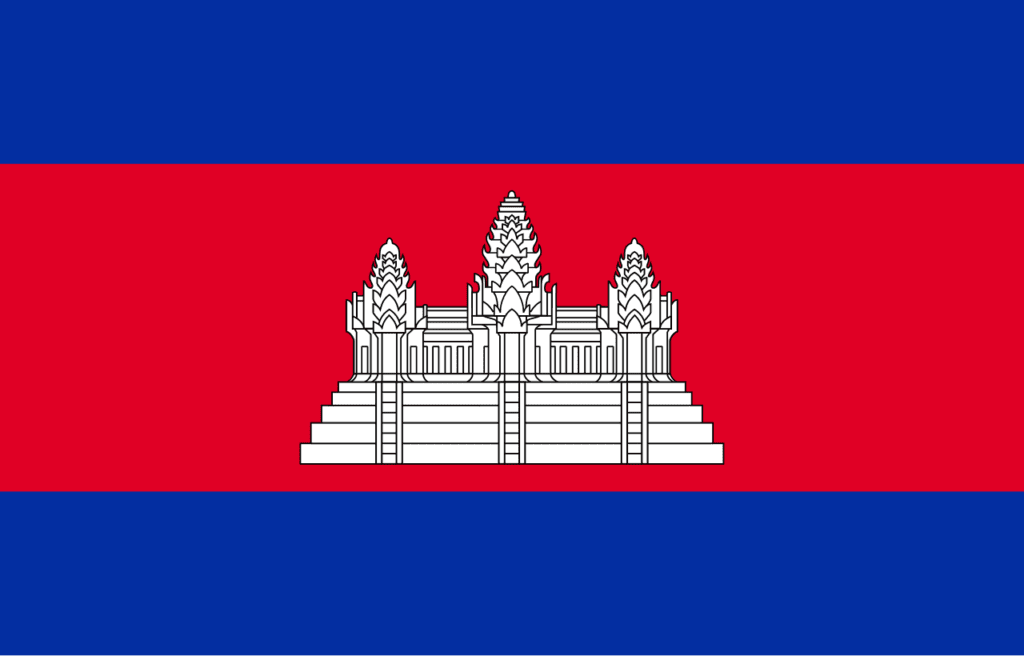
Cambodia
For 2,000 years Cambodia’s civilization absorbed influences from India and China and, in turn, transferred them to other Southeast Asian civilizations. From the Hindu-Buddhist kingdoms of
Funan and Chenla (1st–8th century) through the classical age of the Angkor period (9–15th century), it held sway over territories that are now part of Thailand, Vietnam, and Laos. The Khmer (Cambodian) empire reached its apex in the 12th century, a time marked by the construction of the massive temple complexes known as Angkor Wat and Bayon and the imperial capital of Angkor Thom. Following 400 years of decline, Cambodia became a French colony and during the 20th century experienced the turmoil of war, occupation by the Japanese, post-war independence, and political instability.
Between 1975 and 1979 the country was devastated by the reign
of the Khmer Rouge, a rural communist guerrilla movement. During the Khmer Rouge’s period of power, at least 1.5 million Cambodians were killed or died, on the ‘Cambodian Killing Fields’, a monumental tragedy from which the country still suffers.
Cambodia began the process of recovery under the Vietnam- backed regime of the People’s Republic of Kampuchea (1979–89), and in the 1990s it regained political autonomy, re-established
a constitutional government, and subsequently instituted free elections. The Cambodian economy has steadily improved, and the
country seems to be living by the words of the Cambodian proverb, “Fear not the future, weep not for the past.”
Christian missionaries have translated the Bible into the Khmer language, making it accessible to Cambodians who don’t read English. The Khmer Bible is distributed freely by missions organizations and local churches. Having scripture in their ‘mother- tongue’ allows Cambodians to read and understand the Christian message for themselves.
Cambodia is predominantly Buddhist with 80% of the population being ‘Theravada Buddhist’, 1% Christian and the majority of the remaining population follow Islam, atheism, or animism. In 1923, Protestant missions began in Cambodia, and Christianity started to spread. The Cambodian church grew rapidly in the following decades. Historically, this growth was cut short by the Khmer Rouge regime in the 1970s. Many Christians were killed, and the remaining church was forced underground.
After the fall of the Khmer Rouge, the Christian church began to rebuild. Today, about 2% of Cambodians are Christian. While
still a minority, Christianity is transforming Cambodian society in important ways. Churches and faith-based organizations provide education, healthcare, and community support. They also advocate for human rights, religious freedom, and an end to corruption.
Christianity in Cambodia has a complex history marked by periods of growth and persecution. Yet, through it all, the Cambodian church has persevered. While still small, it continues to gain influence and shape Cambodia for the better through its mission to serve and empower the poor. The future is bright for Christianity in this predominantly Buddhist nation.
There is a degree of social hostility toward Christians in Cambodia. Many Cambodians practice ‘Theravada Buddhism’, and some see the spread of Christianity as a threat. Christians face discrimination in employment and education. In rural areas, new Christian converts can face pressure from Buddhist monks and villagers to renounce their faith. Some Christians have even faced physical violence
and threats. This social hostility creates a climate of fear for many Cambodian Christians.
PRAYERS FOR Cambodia
- Pray for actual freedom of religion. Although the constitution guarantees it, yet the government has re-affirmed the ban on door-to-door evangelism and on public distribution of tracts. Pray for actual freedom to wisely and appropriately spread the good news (i.e. the real Gospel 1Co 15:1-4).
- Freedom from spiritual bondage, deliverance from past sin, hatred, suffering and abuse. Deep healing is required for many who suffered acute trauma. Many of the former Khmer Rouge have become believers; therefore it is essential to receiving God’s forgiveness for past crimes.
- Children and young people to be effectively discipled in the churches and shown how to live in healthy family structures; few are equipped for this. Pray that today’s generation begin to lead the Cambodian Church now.
- Church planting and evangelism. “Mission Kampuchea 2021”, a joint initiative now concluded’ discovered that 11,000 of Cambodia’s 14,000 villages were completely without a church or group of believers meeting together.
- The Bible schools: Residential, full-time academic programmes can be a difficult model to successfully translate into the Cambodian context of life and ministry. Pray for wisdom and discernment.
- Existing pastors. Their lack of training, their need to provide for themselves and the overwhelming practical needs of the faithful are huge challenges. Pray for leadership training courses to become available that offer on-the-job development for Christian leaders. Pray for wisdom to build up their fledgling congregations spiritually, relationally and economically.
- The existence of 13 Protestant umbrella groups, indicate the fragmentation of this rather small national Church. Divisiveness has been a problem in the short history of the Church there. The Evangelical Fellowship of Cambodia represents about 80% of the Christian community; it is increasingly able to cooperate with other notable networks, for example the Cambodian Christian Evangelical or the Cambodian Baptist Convention. Pray for a greater sense of unity and for more partnerships that are effective. However, pray that it is better to be separated by Truth, then united in error.





